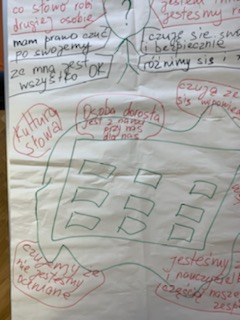Anti-discrimination education is a huge challenge. Reflections after the training on the "Stories that move" tool
Liubov Shynder , IYMC Krzyżowa
In the second half of September I led a training for teachers at the Training and Counselling Centre of the Regional Methodology and Education Centre Metis in Katowice on our anti-discrimination education tool "Stories that Move" (you can read more about this project here).
One of the many things I have appreciated since we started this project is the possibility of dialogue with teachers and exchanging experiences from our work in formal and non-formal education, which we focus on at the International Youth Meeting Centre in Krzyżowa.
Such was the meeting in Katowice. The training was attended by 10 teachers, mainly working in secondary schools. If I were to sum up the reasons why they came to the training, I could make such a statement: "I want to establish a dialogue with my students, I am worried about the xenophobic and nationalistic sentiments I see in my school and I want to counteract it".
The meeting in Katowice was a training on the tool of anti-discrimination education. But it consisted not only in the presentation of the tool, but above all in showing the methods of non-formal education, and the dialogue I mentioned earlier, i.e. the verification of what basis and assumptions of non-formal education are possible to implement in school reality.
I decided to start the training from what is common for each of us, regardless of the type of institution and audience we work with - defining the goal of the classes. Of course, it can be stated quite easily: our goal is for the pupils to understand that discrimination is wrong, or, in more mature language, for the pupils to understand discrimination as a threat to society and to each individual. I wanted to deepen this topic using interactive tools, non-standard questions, the small group method and visual thinking. So, I drew two pictures on the blackboard (you can see them in the attached photo - the comments are the results of the participants' work) and asked the teachers to work in pairs to find answers to two questions:
1 - what thoughts do I want to stay with the pupils after the class about discrimination?
2 - what kind of atmosphere do I want to create in the classroom during the discrimination lesson?
The picture below is not of the best quality, so I will write the trainees' answers here:
 1:
1:
- I have to consider what my word can do to another person.
- I have the right to feel my own way.
- Everything is OK with me.
- I feel comfortable and safe.
- We are different and that is OK.
- Even though I am different, we are equal.
2:
- Atmosphere built on:
- culture of speech,
- solidarity,
- openness,
- cooperation.
- An atmosphere in which pupils feel:
- that an adult is with them, by them and for them,
- that they are not being judged,
- that they are a team and the teacher is part of their team,
- that they can express themselves.
We can see that these objectives sound different from what I proposed at the beginning, which is: "Students' understanding of discrimination as a threat to society and to each person". They differ, but only in that the ones we worked on with the trainees are pedagogical objectives and the one I gave is a substantive objective.
Topics related to discrimination are not easy topics. That is why a broad reflection on the objectives of such classes can make our work easier when preparing and conducting lessons. When we go to our pupils for anti-discrimination lessons, we are supposed to pass on to them values such as equality, solidarity, respect for each person.
I would like this text to sum up by saying that anti-discrimination education is a great challenge. So when implementing such topics, let's allow ourselves for frustration, longer reflection, lessons that will only consist of conversations, and above all, let's be open to young people.
I also recommend a description of the pedagogical approach of the tool „Stories that Move” and interviews with experts in inclusive and anti-discrimination education from different parts of the world, which I guarantee will inspire you to do more.



